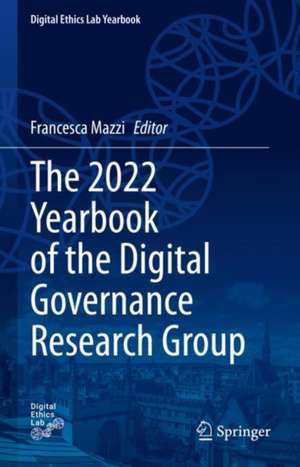The 2022 Yearbook of the Digital Governance Research Group: Digital Ethics Lab Yearbook
Editat de Francesca Mazzien Limba Engleză Hardback – 3 iun 2023
The 2022 edition of the Yearbook presents research on the following topics: autonomous weapons, cyber weapons, digital sovereignty, smart cities, artificial intelligence for the Sustainable Development Goals, vaccine passports, and sociotechnical pragmatism as an approach to technology. This text appeals to students, researchers, and professionals in the field.
| Toate formatele și edițiile | Preț | Express |
|---|---|---|
| Paperback (1) | 549.89 lei 38-44 zile | |
| Springer Nature Switzerland – 4 iun 2024 | 549.89 lei 38-44 zile | |
| Hardback (1) | 640.71 lei 6-8 săpt. | |
| Springer Nature Switzerland – 3 iun 2023 | 640.71 lei 6-8 săpt. |
Preț: 640.71 lei
Preț vechi: 753.77 lei
-15% Nou
Puncte Express: 961
Preț estimativ în valută:
122.62€ • 126.67$ • 102.05£
122.62€ • 126.67$ • 102.05£
Carte tipărită la comandă
Livrare economică 26 martie-09 aprilie
Preluare comenzi: 021 569.72.76
Specificații
ISBN-13: 9783031286773
ISBN-10: 3031286774
Ilustrații: VIII, 166 p. 7 illus., 4 illus. in color.
Dimensiuni: 155 x 235 mm
Greutate: 0.43 kg
Ediția:2023
Editura: Springer Nature Switzerland
Colecția Springer
Seria Digital Ethics Lab Yearbook
Locul publicării:Cham, Switzerland
ISBN-10: 3031286774
Ilustrații: VIII, 166 p. 7 illus., 4 illus. in color.
Dimensiuni: 155 x 235 mm
Greutate: 0.43 kg
Ediția:2023
Editura: Springer Nature Switzerland
Colecția Springer
Seria Digital Ethics Lab Yearbook
Locul publicării:Cham, Switzerland
Cuprins
1.Introduction.- 2.How to counter moral evil: Paideia and Nomos.- 3.Smart Cities: Reviewing the Debate about their Ethical Implications.- 4.The intersections between Artificial Intelligence, Intellectual Property, and the Sustainable Development Goals.- 5.Cyber Weapons and the Fifth Domain: Implications of Cyber Conflict on International Relations.- 6.A Comparative Analysis of the Definitions of Autonomous Weapons.- 7.English School on Cyberspace: Examining the European Digital Sovereignty as an International Society and Standard of Civilization.- 8.Strategic Autonomy for Europe: Strength at Home and Strong in the World — Illusion or Realism.- 9.Saving human lives and rights: recommendations for protecting human rights when adopting COVID-19 Vaccine Passports.- 10.In Defense of Sociotechnical Pragmatism.
Notă biografică
Francesca Mazzi is a postdoctoral research fellow in AI and Sustainable Development at Saïd Business School, University of Oxford, and a research associate of the Digital Governance Research Group of the Oxford Internet Institute, University of Oxford.
Her research interests concern the intersections between technology and law, in relation to challenges and opportunities arising in the Fourth Industrial Revolution era. She is part of the Oxford Initiative on AI×SDGs, aimed at investigating how artificial intelligence (AI) has been and can in the future be used to support and advance the United Nations Sustainable Development Goals (SDGs). She is the co-editor of a forthcoming volume on the Ethics of Artificial Intelligence for the Sustainable Development Goals.
From 2017 to 2020 she was a Marie Sklodowska-Curie Early Stage Researcher within the EIPIN- Innovation Society in a double doctorate program between Queen Mary University of London and Maastricht University. The Ph.D. research project concerned the patentability of AI generated inventions, with a case study on the pharmaceutical industry.
Her research interests concern the intersections between technology and law, in relation to challenges and opportunities arising in the Fourth Industrial Revolution era. She is part of the Oxford Initiative on AI×SDGs, aimed at investigating how artificial intelligence (AI) has been and can in the future be used to support and advance the United Nations Sustainable Development Goals (SDGs). She is the co-editor of a forthcoming volume on the Ethics of Artificial Intelligence for the Sustainable Development Goals.
From 2017 to 2020 she was a Marie Sklodowska-Curie Early Stage Researcher within the EIPIN- Innovation Society in a double doctorate program between Queen Mary University of London and Maastricht University. The Ph.D. research project concerned the patentability of AI generated inventions, with a case study on the pharmaceutical industry.
Textul de pe ultima copertă
This annual edited volume presents an overview of cutting-edge research areas within digital ethics as defined by the Digital Governance Research Group of the University of Oxford. It identifies new challenges and opportunities of influence in setting the research agenda in the field.
The 2022 edition of the Yearbook presents research on the following topics: autonomous weapons, cyber weapons, digital sovereignty, smart cities, artificial intelligence for the Sustainable Development Goals, vaccine passports, and sociotechnical pragmatism as an approach to technology. This text appeals to students, researchers, and professionals in the field.
Caracteristici
Provides an overview of cutting edge research in the field of digital ethics Outlines the approaches of one of the most influential research groups in the field Sets an agenda for future research into this increasingly important field




